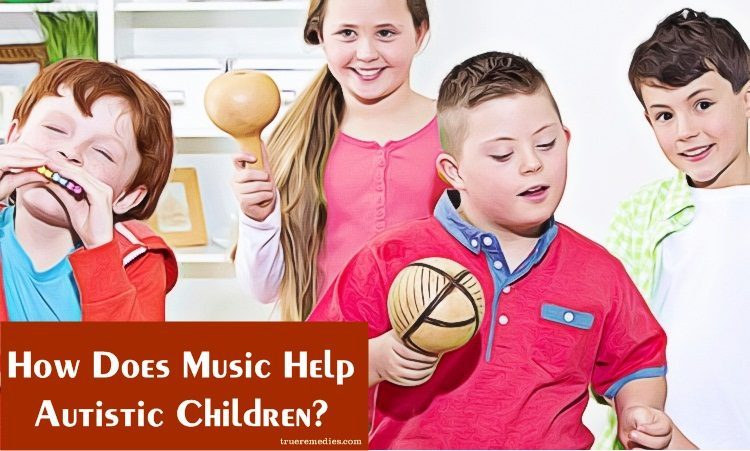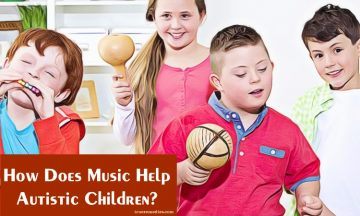Table Of Contents
Autism Spectrum Disorder not only has been considerable concern for the whole community but also has become a burden on the parents who have autistic children. Autism may have harmful impacts on the children’ development of social, verbal and cognitive abilities. Today TrueRemedies would like to introduce a new method in the treatment of autism in children. Keep reading until the end of this paper to find out what it is.
- I Was Shocked When Doctors Concluded That My Twins Were Autistic
- Top 5 Benefits Of Music On A Baby’s Brain Development
- Top 9 Proven Secrets To Be A Happier Mom At Home (This article was medically reviewed/fact checked by Dr. Robi Ludwig)
Autistic Children And Benefits Of Music Therapy For Them
I. What Is The Role Of Music Therapy In The Treatment Of Autism?
Music is considered a special stimulant to autistic children, so they can take part in and enjoy music activities. Music therapy to these children often focuses on:
- Improving the coordination of both gross and fine motor[1]
- Lengthening children’ attention time
- Developing awareness of the body
- Developing self-concept
- Enhancing social skills
- Improving oral and non-oral communication[2]
- Assisting in the learning process of basic knowledge before and during school
- Terminating or change ritual behaviors
- Reducing symptoms relating to mental health, such as anxiety, anger and hyperactivity
II. Techniques Used In The Music Therapy
- Vocal exercises: Individual singing, a combination of vowels and consonants with appropriate rhythm transliteration, with breathing support.
- Sing and chanting
- Exercise: Dancing, creative movement, practice mimic techniques.
- Music games
- Working on musical instruments: Using techniques to imitate or improvise.
- Listen to music
III. Some Music Interventions And Therapies For Autistic Children
1. Forms Of Intervention: Individual And Group
For children with autism, individual education is a premise for children to participate in music activities in groups. With this method, teachers can apply activities in accordance with the characteristics of the individual's defect, helping children get used to songs and rhythms.
The form of group intervention should be based on the grouping of children according to the level of development of similar skills. Each group should only have five children. If the number is more, the coordination of teachers should be involved in childcare education. Music activities in groups will bring an opportunity for children to interact with friends around. From those activities, children will gradually develop interactive skills. Plus, group music activities help children step out of the world to express themselves. Receiving encouragement will be a motivation for them to get along with other people.
2. Listening To Music‚ Singing With Children‚ Organizing Music Games‚ Teaching Children To Interact With Musical Instruments
Listening to music is an activity that has a profound impact on the soul, contributing to the development of human emotions[3]. The melodious and soothing music played up can soothe uncomfortable and irritable emotions; the music has a vibrant nature which may help encourage children to be more active to play with you. Besides, familiar tunes can make a daily impression for children.
First of all, children need to recognize and reflect on sounds in everyday life, such as animal sounds and car horns. However, it is also important to avoid sounds that cause discomfort for children and let children get used to those sounds in ascending levels.
TrueRemedies Partner Solutions

Need a Help from the Leading Expert Online, Available 24/7?
They’re all here and ready to answer your questions online or by phone. Keep asking questions until you get the answer you need.
Let children listen to songs and music that match their interests and disorder characteristics. Active children listen to soothing songs; Children with reduced mobility or lumbering are likely to listen to vibrant songs.
People who implement music therapy need to ensure that the sound should be opened at a moderate level to avoid causing negative effects for children. You can organize private music time for children about 15 minutes in combination with small movements, such as sitting in a circle, or holding hands together in a circle and rotating the movement in rhythm to form interacting skills naturally.
Singing with children is a way to increase the child's interest in speech and strengthen communication skills and raise their awareness of the surrounding environment. Singing softly with children may show your affection to children and help nurture the inner world of their love.
For children with autism, the selection of songs should be appropriate to their interests. The recommended songs should be short, have clear musical images, easy lyrics and rhythms. You can use pictures and stuffed animals to illustrate the lyrics, create attention, and increase the interest in children when singing with a new, funny, funny and expressive voice.
To encourage children to sing‚ the teacher needs to use their favorite instruments such as the xylophone and drums. That is considered as a motivation for children to pronounce the word that the teacher teaches them to say.
Music games are combined activities, including listening, singing, and organizing activities in the form of games. That will attract children more and enhance their motor skills and interaction.
For autistic children, games should be simple, concise, and appropriate. However, those children somehow develop much slower than normal ones, so it is vital to persevere playing repeatedly. When you increase the level of the game, its content should not be different as autistic children may find it difficult to accept changes.
Before organizing music games, teachers need to have a specific plan for each step and must prepare both music and tools. It is pivotal to have the support of a childcare teacher to make the game instructions more effective. Moreover, the observation and support of teachers will ensure the safety of children when participating. Teachers should not talk too much, but make a model for children to imitate, use voice commands: start and stop for children to understand information and follow gradually. There should be a method for children to like and play voluntarily; teachers need a playful and humorous face to create a fun atmosphere from the beginning to attract children. For children to maintain participation in the game, they need encouragement, praise and even gifts for them.
Teaching children to use musical instruments is a method to help children to boost concentration, improve motor skills and reduce some behaviors such as shaping behaviors. Simple musical instruments with funny sounds support children to become more interested in participating in music activities.
We hope that all the above information will be effective and helpful to parents of autistic children. Be patient and learn a new way to educate them with music therapy. If you want to explore more knowledge about parents and babies, our page Parenting is one of the best choices for you. If you would like to share your experience or have any questions, feel free to leave your comments below. We are very glad to receive your reaction. Thank you!









